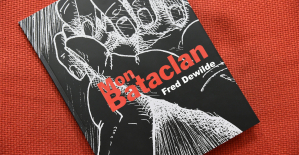Historic, the trial of Éric Dupond-Moretti before the Court of Justice of the Republic (CJR) restarts this Monday the only jurisdiction authorized to judge members of the government. For the first time, a serving minister will face the fifteen judges who make up the CJR. On the dock for illegal taking of interests, the Minister of Justice risks five years of imprisonment and a fine of 500,000 euros as well as a sentence of ineligibility and prohibition from holding public office.
Created in July 1993 to replace the High Court of Justice, the Court of Justice of the Republic opened its first trial in 1999, when it had to judge three former ministers involved in the contaminated blood affair. In all, eight ministers and two secretaries of state came before the special jurisdiction.
On February 9, 1999, three members of the government marked the history of the Fifth Republic, by inaugurating the first trial of the Court of Justice of the Republic. In office during the contaminated blood affair, former Prime Minister Laurent Fabius (1984-1986), former Minister of Social Affairs Georgina Dufoix and Edmond Hervé, then Secretary of State for Health, appeared before the jurisdiction. Accused of inaction in the 1980s when hundreds of people received blood transfusions contaminated with the AIDS virus, the three politicians are being prosecuted for homicide and involuntary injuries. On March 9, 1999, Laurent Fabius and his former Minister of Social Affairs were acquitted while Edmond Hervé was found guilty of “failure to fulfill an obligation of security or prudence” but was exempted from punishment. Controversial, the decision aroused numerous criticisms against the CJR, which became the symbol of a justice complacent towards those in power.
The matter seems trivial. However, she took Ségolène Royal before the judges of the Court of Justice of the Republic in 1999. Two years earlier, the socialist was accused of defamation by two teachers from the Thiers high school in Marseille in the context of a hazing case. Then Minister of School Education, she pointed out the “complicity of adults” in the hazing of students in preparatory classes for the veterinary school competition, without expressly naming the teachers involved. This did not prevent those concerned from suing him for defamation. Ségolène Royal was finally acquitted in May 2000, the Court having considered that she had provided “perfect and complete proof” of her accusation.
After a ten-year investigation, the Secretary of State for Disabled People under François Mitterrand was finally found guilty of fraud to the detriment of the State in July 2004. Thanks to a financial arrangement, Michel Gillibert managed to divert, between 1988 and 1993, 8.5 million francs in public subsidies via associations created ad hoc. By sentencing the former Secretary of State to three years' suspended imprisonment and a fine of 20,000 euros, the CJR imposes a sentence on an accused for the first time. The former businessman was also deprived of his right to vote for a period of five years as well as his eligibility.
April 30, 2010. At the age of 83, Jacques Chirac's emblematic Minister of the Interior, Charles Pasqua (1993-1995), is sentenced to a one-year suspended prison sentence for embezzlement. Found guilty in only one of the three embezzlement cases for which he was prosecuted, the former top cop in France received a sentence for complicity in misuse of corporate assets and complicity in receiving stolen property in the Sofremi contracts affair, a private equity company. police equipment linked to the Interior. Charles Pasqua is released for the affairs of the Annemasse casino and the GEC-Alsthom group.
Seventeen years after the trial of Edmond Hervé, the Court of Justice of the Republic once again pronounces the guilt of an accused without dispensing with punishment. This time, it is the former Minister of the Economy Christine Lagarde (2007-2011) who is accused of her “negligence” in the arbitration between Bernard Tapie and Crédit Lyonnais in 2007. The current president of the European Central Bank was criticized for having given its agreement in 2007 to the procedure between Bernard Tapie and Crédit Lyonnais, which had allowed the businessman to pocket 403 million euros of public money .
In 2019, four before Éric-Dupond-Moretti, Jean-Jacques Urvoas became the first Minister of Justice to appear before the Court of Justice of the Republic. Briefly Minister of Justice between 2016 and 2017, the socialist was sentenced in 2019 to one month of suspended imprisonment and a fine of 5,000 euros for “violation of professional secrecy”. The former tenant of Place Vendôme was found guilty of having shared in 2017 with Thierry Solère, then member of the Les Républicains, information on an investigation for tax fraud and influence peddling therefore he was the subject.
Founder of the Court of Justice of the Republic in 1993, the former Prime Minister of the RPR (1993-1995) paid the price twenty-eight years later. Alongside François Léotard, his Minister of Defense, Édouard Balladur was implicated for his participation in a secret financing system serving the 1995 presidential campaign. Accused of “complicity in the abuse of corporate assets” and of “concealment”, he was finally released. His former colleague, also accused of “complicity in misuse of corporate assets”, was sentenced to a two-year suspended prison sentence and a fine of 100,000 euros.

 In Germany, the far left wants to cap the price of “doner kebabs”
In Germany, the far left wants to cap the price of “doner kebabs” Israel-Hamas war: Gaza between hope of truce and fear of Israeli offensive in the South
Israel-Hamas war: Gaza between hope of truce and fear of Israeli offensive in the South “Mom, Dad, please don’t die”: in the United States, a nine-year-old child saves the lives of his parents injured in a tornado
“Mom, Dad, please don’t die”: in the United States, a nine-year-old child saves the lives of his parents injured in a tornado War in Ukraine: Putin orders nuclear exercises in response to Macron and “Western leaders”
War in Ukraine: Putin orders nuclear exercises in response to Macron and “Western leaders” A baby whose mother smoked during pregnancy will age more quickly
A baby whose mother smoked during pregnancy will age more quickly The euro zone economy grows in April at its best pace in almost a year but inflationary pressure increases
The euro zone economy grows in April at its best pace in almost a year but inflationary pressure increases Children born thanks to PMA do not have more cancers than others
Children born thanks to PMA do not have more cancers than others Breast cancer: less than one in two French women follow screening recommendations
Breast cancer: less than one in two French women follow screening recommendations Call for strike on Sunday at Radio France against “the repression of insolence and humor” after the suspension of Guillaume Meurice
Call for strike on Sunday at Radio France against “the repression of insolence and humor” after the suspension of Guillaume Meurice Disney: profitable streaming for the first time, after 5 years of losses
Disney: profitable streaming for the first time, after 5 years of losses “I’m going to four concerts... I spent 1,255 euros”: for Taylor Swift, these fans ready to break the bank
“I’m going to four concerts... I spent 1,255 euros”: for Taylor Swift, these fans ready to break the bank SNCF: the CEO defends the agreement on the end of career, “reasonable, balanced and useful”
SNCF: the CEO defends the agreement on the end of career, “reasonable, balanced and useful” A little something extra, signed Artus, exceeds one million entries in less than a week
A little something extra, signed Artus, exceeds one million entries in less than a week Fred Dewilde, designer and Bataclan survivor, ended his life
Fred Dewilde, designer and Bataclan survivor, ended his life “I don’t appreciate being used as media cannon fodder”: Emmanuelle Bercot responds to Isild Le Besco
“I don’t appreciate being used as media cannon fodder”: Emmanuelle Bercot responds to Isild Le Besco Who is Deborah de Robertis, the artist who painted The Origin of the World?
Who is Deborah de Robertis, the artist who painted The Origin of the World? Omoda 7, another Chinese car that could be manufactured in Spain
Omoda 7, another Chinese car that could be manufactured in Spain BYD chooses CA Auto Bank as financial partner in Spain
BYD chooses CA Auto Bank as financial partner in Spain Tesla and Baidu sign key agreement to boost development of autonomous driving
Tesla and Baidu sign key agreement to boost development of autonomous driving Skoda Kodiaq 2024: a 'beast' plug-in hybrid SUV
Skoda Kodiaq 2024: a 'beast' plug-in hybrid SUV The home mortgage firm rises 3.8% in February and the average interest moderates to 3.33%
The home mortgage firm rises 3.8% in February and the average interest moderates to 3.33% This is how housing prices have changed in Spain in the last decade
This is how housing prices have changed in Spain in the last decade The home mortgage firm drops 10% in January and interest soars to 3.46%
The home mortgage firm drops 10% in January and interest soars to 3.46% The jewel of the Rocío de Nagüeles urbanization: a dream villa in Marbella
The jewel of the Rocío de Nagüeles urbanization: a dream villa in Marbella Europeans: David Lisnard expresses his “essential and vital” support for François-Xavier Bellamy
Europeans: David Lisnard expresses his “essential and vital” support for François-Xavier Bellamy Facing Jordan Bardella, the popularity match turns to Gabriel Attal’s advantage
Facing Jordan Bardella, the popularity match turns to Gabriel Attal’s advantage Europeans: a senior official on the National Rally list
Europeans: a senior official on the National Rally list Blockade of Sciences Po: the right denounces a “drift”, the government charges the rebels
Blockade of Sciences Po: the right denounces a “drift”, the government charges the rebels These French cities that will boycott the World Cup in Qatar
These French cities that will boycott the World Cup in Qatar Mercato: Thiago Silva returns to Brazil and signs for Fluminense
Mercato: Thiago Silva returns to Brazil and signs for Fluminense Top 14: at what time and on which channel to follow the clash at the Toulouse-Stade Français summit?
Top 14: at what time and on which channel to follow the clash at the Toulouse-Stade Français summit? Tennis: Paula Badosa, former world No.2, passes the 1st round in Rome
Tennis: Paula Badosa, former world No.2, passes the 1st round in Rome Tour of Italy: Italian Jonathan Milan wins the 4th stage, Pogacar still leader
Tour of Italy: Italian Jonathan Milan wins the 4th stage, Pogacar still leader


















